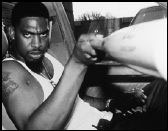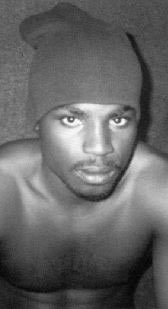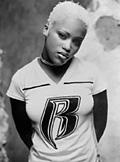PASTOR TROY
Face Off Madd Society/Universal
PREFUSE 73
Vocal Studies & Uprock Narratives Warp
THE SOUTH’S FIRST HIP-HOP wave may be a historical footnote by now, but there’s still insurgent blood flowing through the region. Pastor Troy’s been stirring shit up for the past three years over an old-school territorial grudge. “No Mo Play in GA,” from Troy’s first album We Ready I Declare War (Madd Society), is a calculated smackfest towards dirty South monopolist Master P and his once-pulsing Louisiana empire, No Limit Records. The track opens with a phone skit, Troy calling up the No Limit offices and asking for P. When P’s unavailable, Troy leaves a warning message: “Since everybody think they soldiers, then what’s up? We’ll go to war.” Them’s fighting words, indeed. But why’s Troy so salty? After all, there’s room enough below the Mason-Dixon for everyone to lick shots and still not hit each other, right? Turns out Percy Miller and his bayou clan were encroaching on the South like Microsoft. For a cocky young squirt of a rapper like Troy, such arrogance didn’t go down easy. Over a machine-gun fusillade, Troy kicks needling taunts to P: “Now what’s up, big mouth? Big talk? Big game? . . . We got mo’/You ain’t know?” By all accounts, Troy hadn’t ever met any of the No Limit family and never got the chance to express his dissatisfaction in person, though allegedly the beef was squashed over the phone.
And Troy shouldn’t worry. Thanks largely to his ballsy maneuvers, he’s got a national distribution deal of his own to brag on. Face Off is the first fruit of this alliance, a collection of new material interspersed with greatest hits from Troy’s earlier albums. He’s a gangly MC. He hoots and hollers, screams and shouts, with a ferociously scratchy vocal quality that stands hair on end. Each syllable carries with it the potential for pain, sometimes violent, often emotional. The former is seen on “I’m Made” and “Throw Yo Flags Up,” as well as the reprised “No Mo Play.” But oddly, it’s the latter, the psychological warfare Troy displays, that makes Face Off such a compelling listen. “Can You Stand the Game,” which flips New Edition’s “Can You Stand the Rain?” into a gangster’s lament, finds Troy repentant, wishing for the comforts of a good woman: “Sometimes I wonder do you miss me?/ How I miss you.” On “Eternal Yard Dash,” Troy groans, “It’s a race and I got a bad heart . . . I’m running for nothing.” Troy closes out the disc with “Oh Father” and “Prayer,” last-chance missives to the Almighty pleading for salvation of some form after an hour of messy morality.
But not all second-gen Southern hip-hop comes with a cleric’s tunic and an AK. Producer Scott Herren spent the better part of the first Southern hip-hop explosion putting in penance at a Decatur, Ga., recording studio, the de facto liaison between the rock geek who owned the studio and the down-South roughnecks who used it to commit their angst to wax. “The owner bought me my first MPC so I could make beats for these guys,” remembers Herren. “They were from the illest apartment complexes in Atlanta. I’d go in the studio and make the beat right in front of them, and them just hitting a few keys over and over again. They’d go, ‘Yeah yeah that’s dope,’ and that’d be the track. It was so raw. They wouldn’t do individual vocal takes. They’d stand around the mic and do it all together.”
As a musical affair, Troy’s Face Off doesn’t veer to far from this one-man-and-his-beat-machine theology. Drums are dense and spare, each kick as potently accentuated as the others. Add in grinding guitar power riffs and you’ve got a formula for hip-hop punk rock.
But what works for Troy was just the type of music that sent Herren on a quest for his own sound. The first result of that frustration was the ambient-glitchy Brokeback EP (Schematic): “The EP is basically me sad in the studio, like ‘I don’t wanna do this jiggy shit.’ I was just trying my best to do whatever it was that was different.”
Four years later, Herren has found his middle ground on Vocal Studies & Uprock Narratives (Warp), recorded under the alias Prefuse 73. A thrilling amalgamation of tricky self-sampling electronics and hip-hop rhythm patterns, it’s the most genuine homage electronic music has made yet to hip-hop, a far cry from IDM phrase-nabbing and booty glitch. Herren borrows DJ Shadow’s sense of pastiche and El-P’s anarchic soundwall and finds a melodic spin on both that doesn’t forsake fundamental boom-bap requirements. “Blacklist” is liquid enough to accommodate the drunk ravings of MF Doom and the near-grandiloquence of Aesop Rock. On “Life/Death,” Herren changes the beat damn near every second and it still flows. It’s clear Herren is no bedroom rap fanatic; he can make beats for anyone. “I want my next album to be a dirty South Prefuse record,” Herren grins without a hint of irony. I suggest Pastor Troy for a guest and he asks excitedly, “Do you know him?”








